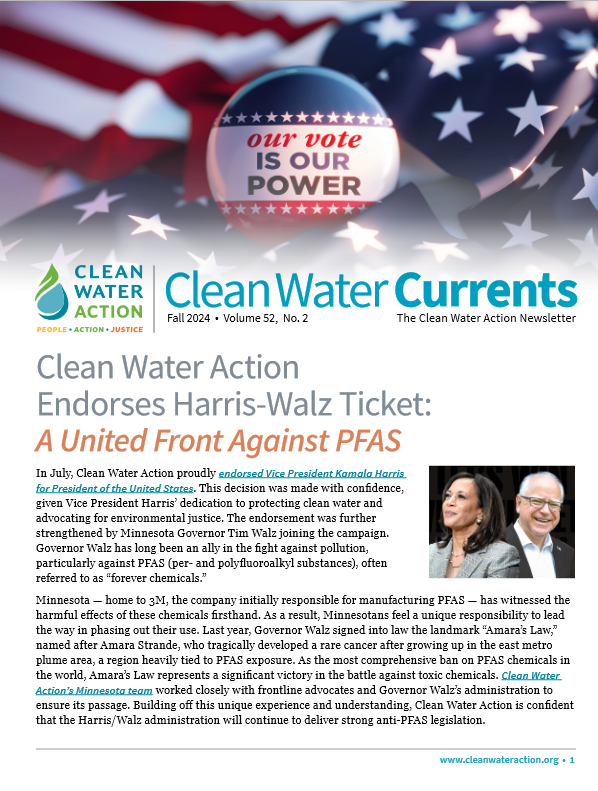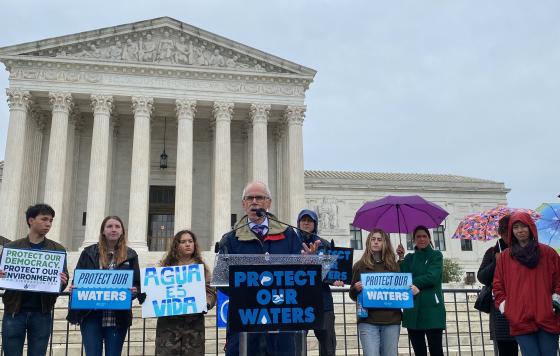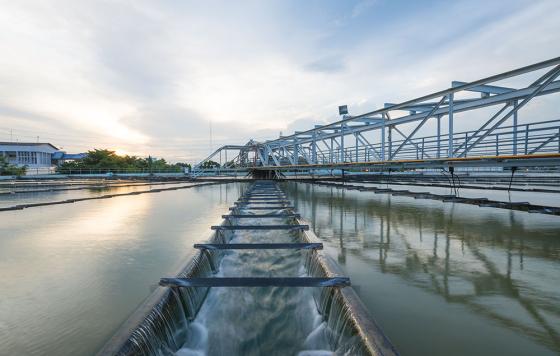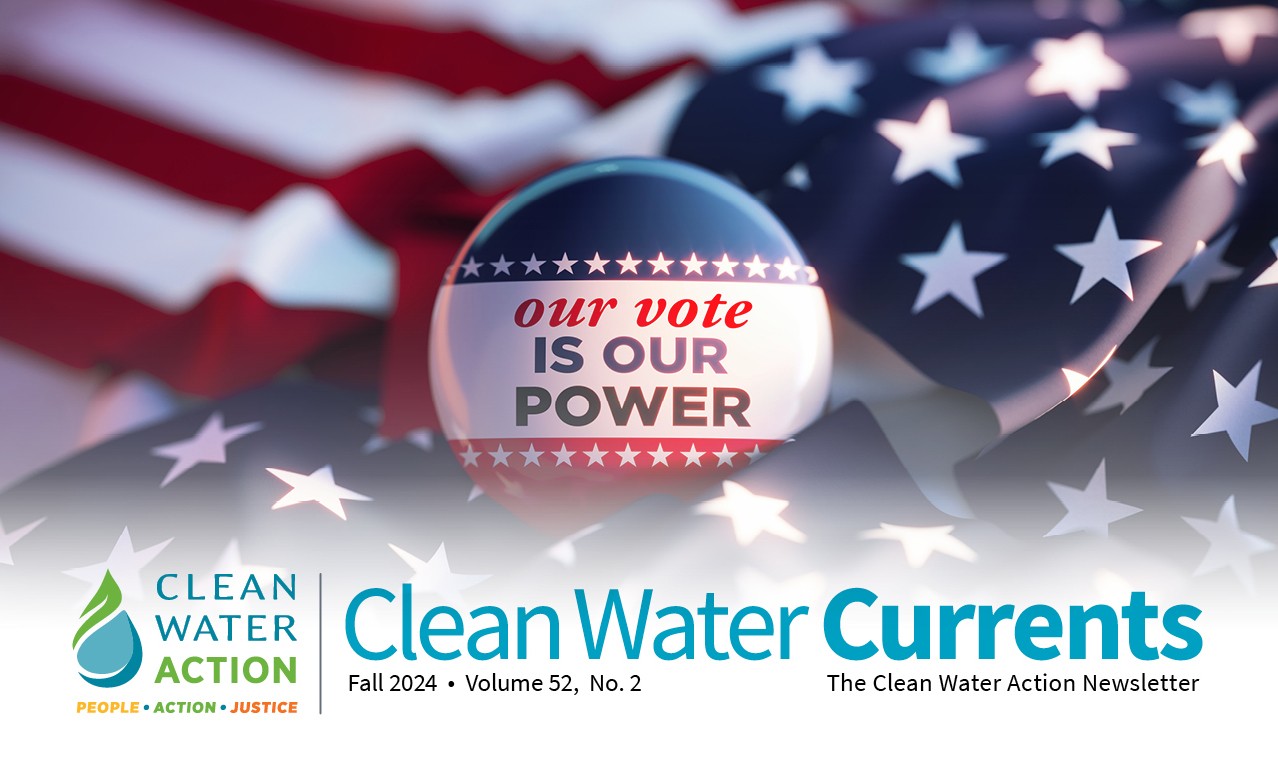
In This Issue:
National News
- Clean Water Action Endorses Harris-Walz Ticket: A United Front Against PFAS
- Our Waters Remain at Risk After the Sackett v. EPA Supreme Court Decision
- Federal Budget: Environmental and Health Protections Threatened Once Again
- New Guide for Engaging with Water Pollution Permits
State and Regional News
- California
- Chesapeake (DC, Maryland, Virginia)
- Michigan
- Minnesota
- New England (Connecticut, Massachusetts, Rhode Island)
- New Jersey
- Pennsylvania
- Texas
- Download a PDF of this issue
Clean Water Action Endorses Harris-Walz Ticket: A United Front Against PFAS

In July, Clean Water Action proudly endorsed Vice President Kamala Harris for President of the United States. This decision was made with confidence, given Vice President Harris’ dedication to protecting clean water and advocating for environmental justice. The endorsement was further strengthened by Minnesota Governor Tim Walz joining the campaign. Governor Walz has long been an ally in the fight against pollution, particularly against PFAS (per- and polyfluoroalkyl substances), often referred to as “forever chemicals.”
Minnesota — home to 3M, the company initially responsible for manufacturing PFAS — has witnessed the harmful effects of these chemicals firsthand. As a result, Minnesotans feel a unique responsibility to lead the way in phasing out their use. Last year, Governor Walz signed into law the landmark “Amara’s Law,” named after Amara Strande, who tragically developed a rare cancer after growing up in the east metro plume area, a region heavily tied to PFAS exposure. As the most comprehensive ban on PFAS chemicals in the world, Amara’s Law represents a significant victory in the battle against toxic chemicals. Clean Water Action’s Minnesota team worked closely with frontline advocates and Governor Walz’s administration to ensure its passage. Building off this unique experience and understanding, Clean Water Action is confident that the Harris/Walz administration will continue to deliver strong anti-PFAS legislation.
Our Waters Remain at Risk After the Sackett v. EPA Supreme Court Decision
In May 2023, the U.S. Supreme Court issued its devastating decision in the case of Sackett v. EPA. This decision narrowed the Clean Water Act’s definition of “Waters of the United States” and removed protections for more than half of wetlands and for thousands of miles of streams throughout the country. The Supreme Court opened the doors for real estate developers, fossil fuel interests, industrial agriculture, and other industries to destroy these valuable resources. This ruling not only threatens vital wildlife habitats and ecosystem services like flood mitigation, but also puts the drinking water of tens of millions of people at risk.
Clean Water Action is actively working to strengthen wetland and stream protections at both the state and federal levels. In Colorado, we celebrated a victory with the passage of House Bill 24-1379. Governor Polis signed the bill into law in May 2024, making Colorado the first state to pass legislation restoring protections to wetlands and streams that were lost because of the Sackett decision. This was the culmination of a year of advocacy, and Clean Water Action, along with our allies, will continue to take an active role as the rulemaking process advances. It is crucial that other states fill the gaps left behind by the Sackett decision.
However, water does not abide by state boundaries, and upstream protections greatly impact downstream waterways and drinking water sources. Relying on state-level protections alone could lead to inconsistencies and gaps that may leave many of our streams and wetlands at risk. This is why we need to urge our U.S. Representatives to support a national congressional fix to the Clean Water Act that ensures the permanent protection of all vulnerable waters and wetlands across the country.
The outcome of this year’s election will be pivotal for many of our key campaign issues, including finding durable, practical solutions to protect vulnerable wetlands and streams. Clean Water Action is committed to advocating for a long-term federal solution, supporting other federal tools to help fill the gaps in protection, improving protections on the state level, and protecting our water quality and drinking water.
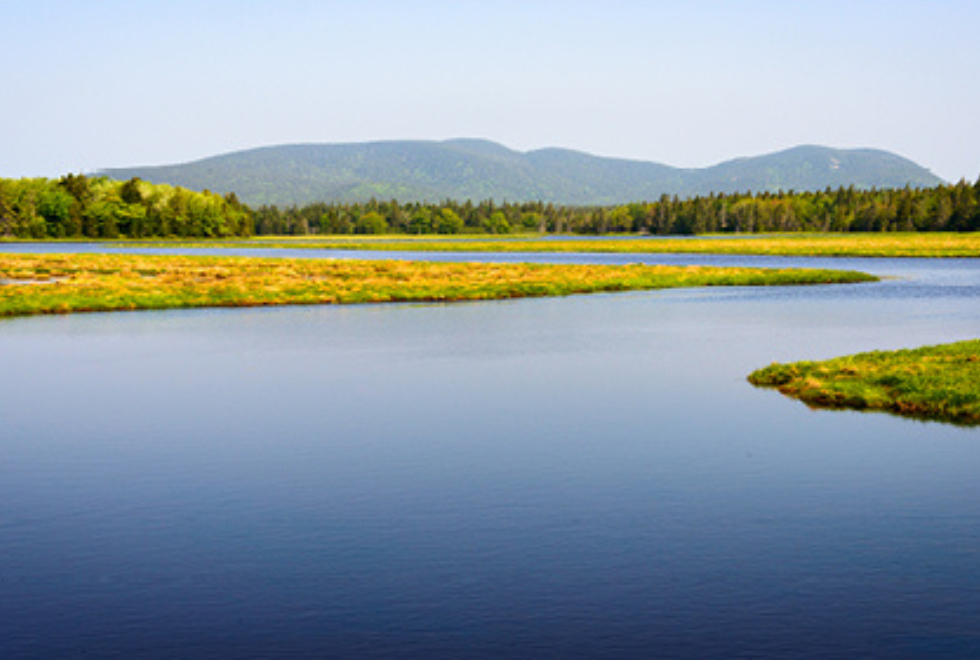
Federal Budget: Environmental and Health Protections Threatened Once Again
Every year, the U.S. Congress must approve a federal budget to allocate to agencies and their programs. This “appropriations” process is critical to clean water, clean air, and other environmental health programs carried out by the Environmental Protection Agency (EPA) and other agencies. The National Programs team at Clean Water Action monitors this process, recognizing its profound impact on clean water, healthy communities, and safe environments. Unfortunately, funding the government has recently become a battleground for partisan agendas that threaten to undermine our government’s functionality — and this year is no exception.
In a concerning trend, extremists within the U.S. House of Representatives are launching aggressive efforts to dismantle essential environmental programs and regulatory agencies. Clean Water Action is not standing idly by. Over the past few months, we have actively rallied Congress to ensure robust funding for the government agencies that protect our water and communities. Through strategic collaborations, we are working with allies to weigh in on key junctures of the appropriations process and demanding that critical programs receive the funding they deserve while pushing back against harmful “riders” attached to appropriations bills that jeopardize our environmental protections. We continue to defend key environmental programs, rallying clean water advocates to do the same.
In July, our National Water Campaigns Coordinator, Sean Jackson, articulated the consequences of the proposed environmental rollbacks. Clean Water Action is committed to defending the hard-won protections that safeguard our environment and our communities. Together, we will continue to fight for a future where clean water and healthy ecosystems are not just ideals, but realities for all.
New Guide for Engaging with Water Pollution Permits
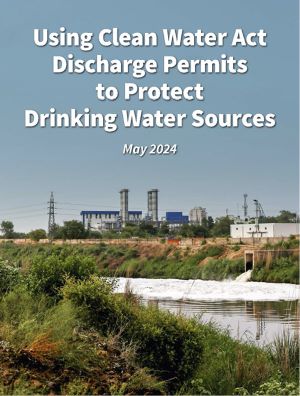
The Clean Water Act safeguards rivers, streams, lakes, and other surface water by limiting the amount of pollution going into them. One of the Act’s most important programs issues permits to limit water pollution from specific industrial sources. The law envisions robust public participation in these National Pollutant Discharge Elimination System (NPDES) permits, but the process can be technical and intimidating.
However, people, organizations and institutions have a stake in pollution going into local water bodies, for example those that could impact a drinking water source. Clean Water is a lead author of a new guide that breaks down the permitting process and helps people develop comments on new permits or permit revisions. Using Clean Water Act Discharge Permits to Protect Drinking Water focuses particularly on protecting drinking water sources from PFAS chemicals and other contaminants, but can be useful to all stakeholders interested in understanding how to weigh in on local water pollution decisions.
State and Regional News
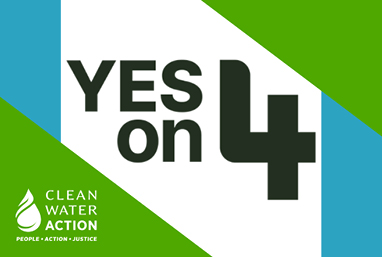
Clean Water Action worked to get funding for safe drinking water into SB 867, which was placed on the November ballot as Proposition 4, a $10 billion climate bond that includes funding for safe drinking water, wildfire prevention strategies, coastal resilience and renewable energy. Learn more: cleanwater.org/yeson4
Our Rethink Disposable program has released a new video highlighting some of our recent successes, featuring the Gurdwara Temple, Berkeley’s iconic Freight & Salvage, and Julie’s Coffee & Tea Garden in Alameda. Watch the video: cleanwater.org/Alameda
Our Toxics Program conducted outreach this summer to small water systems throughout the state to sign them up for free PFAS testing. This will be the most comprehensive testing possible, for both PFAS we can identify and the total load of the chemicals, including those we can’t give a name to. This data will inform future state action on these “forever chemicals”.
Lost Hills
Clean Water has been working for the past decade with residents of Lost Hills in western Kern County as they fight pollution and protect their community. Among the myriad nearby pollution sources are two highways, oil fields, gas and hazardous waste plants, and…almonds. That’s right, almonds have created some of the biggest headaches for this community in the past year: first a 3-week compost fire last August that choked the community, then over the past several months, an inundation of rats when a nearby orchard was cleared, and now a finding from state air monitors that the local processing plant may be releasing dangerous levels of a toxic chemical. Lost Hills is a company town, boasting both a park and a private school built by Wonderful Company. Will Wonderful also provide a clean and safe environment?
Maryland
Maryland has finally created a new heat stress standard! This new heat standard will better protect workers experiencing heat at work by ensuring shade, water, cooling, and proper education on what heat illness looks like so workers can get health interventions sooner.
In Baltimore City, sewage backs up from the City’s sewer pipes into people’s homes thousands of times per year, costing households thousands of dollars and more in damages and creating both acute and long-term health hazards — but the City is fighting against an EPA order to offer emergency disinfection assistance whenever it happens. We’re working to get City government to back down and start ensuring that residents aren’t left to clean up the City’s sewage infrastructure woes themselves.
We are working with a community in central Maryland to fight a proposed chemical recycling project. Chemical recycling is a toxic process that turns plastics into fuel and other chemicals. It is heavily promoted by the plastic industry as a solution to our plastic problem, instead of reducing the amount of plastic that we use and produce.
District of Columbia
We continue to partner with Anacostia Park and Community Collaborative (APACC), focusing recently on the need for heat-resilient systems. APACC has been engaging with various DC agencies on projects to improve access to air conditioning in disfavored communities and to mitigate the heat island effect by increasing tree canopy.
Flooding is another major issue facing large parts of DC, and we’ve been collaborating with APACC to get information and resources to make flood-readiness improvements. As part of that effort we worked with APACC to produce a brief DC flooding info sheet you can find here.
APACC continues to act as a community hub for Ward 7 and 8 individuals and organizations to collaborate and support one another around these and many other issues facing their communities.
Virginia
Virginia is updating its septic regulations, and part of this update is to incorporate the impact of climate change and sea level rise. Changing groundwater levels and increased runoff impact the ability of septic systems to properly treat their waste.
Getting Out the Vote
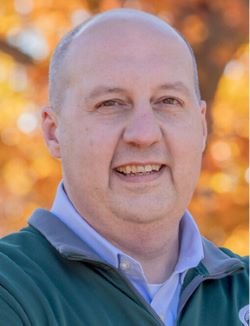
Our Michigan team is in the full swing of election season. We have endorsed candidates in 24 state and federal races, including key endorsements in swing Michigan State House districts and Congressional District 7, where we have endorsed long-time ally Curtis Hertel Jr. in one of the most hotly contested seats nationally to determine control of the U.S. House of Representatives. So far, we have collectively knocked on over 50,000 doors, built our largest campus voter program yet at Michigan State University, and are going all out to ensure that we build an environmental majority both in Lansing and Washington DC. If you live in Michigan, you can vote anytime between now and election day. You can view our full list of endorsements here and you can check out your voter registration and voting options at mi.gov/vote.
Photo: Curtis Hertel Jr.
Brunch for Better
We closed the 3rd quarter by hosting our second annual Brunch for Better event, which celebrated 2024 victories and set the stage for how the Minnesota office is moving forward with powerful initiatives to protect the water we drink.
Representative Frank Hornstein, a former Clean Water Action Minnesota state co-director, received a lifetime achievement award named in his honor to recognize decades of nonstop advocacy which changed the trajectory of environmental work in Minnesota. The Amara Strande Advocacy Award was given to her sister, Nora Strande, for her advocacy in Minnesota, DC, and across the country fighting PFAS and toxic chemical pollution. Minnesota’s landmark PFAS prevention legislation, Amara’s Law, takes effect beginning January 1st. Legislator of the Year awardees Rep. Sydney Jordan and Senator Jen McEwen have been fierce advocates in the legislature, working with us to protect clean water for future generations. Joe Vital was given our Environmental Justice award for his leadership and dedication in the East Phillips neighborhood of Minneapolis. We are proud to honor all our award winners for their hard work advocating for clean, safe, healthy water.
Reducing Waste
We’ve brought on an additional organizer to help expand our electronic waste work, with the intention of improving electronic waste recycling in the state. Our environmental justice work continues, centered around the closure of the Hennepin Energy Recovery Center, otherwise known as the HERC incinerator. Our ReThink Disposables business partnerships are expanding, most recently helping Fawkes Alley Coffee in Minneapolis to convert to reusable serviceware.
Election
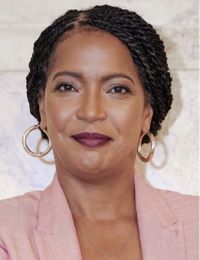
Early voting has begun in Minnesota and we’ve been working in our endorsed candidates’ districts to get out the vote We’ve seen a lot of outside — and dark-money entering Minnesota to defeat our endorsed candidates due to their work passing Amara’s Law. While polling only provides snapshots, and isn’t always reliable, the data suggests several of our endorsed candidates are in neck-and-neck races.
Photo: Rep. Jahana Hayes
Legislative Agenda
Finally, we’re gearing up for the 2025 legislative session with several bills targeting toxic chemicals in consumer products, plastic waste reduction, and continuing to defend against the onslaught of attacks on Amara’s Law from the chemical industry and its lobbyists. We currently have a GOP chief author for two bills on toxics in cosmetics and menstrual products and will work to pass this commonsense legislation. We will also be working to overturn the preemption on local government passing single-use plastic bag bans, adding life cycle assessments to government procurement criteria, establishing a health monitoring program for Minnesotans affected by PFAS exposure, and mitigating PFAS in biosolids.
NEW ENGLAND (Connecticut, Massachusetts, Rhode Island)
CONNECTICUT
PFAS Victory
We’re still buzzing from this summer’s massive campaign victory — a comprehensive ban on toxic PFAS that included both everyday consumer products and, for the first time in the nation, a ban on PFAS in firefighter turnout gear. We are proud to be a part of the coalition working to protect the first responders who protect us.
ReThink Disposable
This fall, we are continuing to expand our ReThink Disposable campaign working directly with partnering schools in Connecticut to phase out single-use disposable dining ware and replace it with durable reusables. We’re keeping plastic trash out of the environment one school meal at a time!
Election
And, of course, please remember to VOTE! We have endorsed Representative Jahana Hayes for re-election in Connecticut’s 5th District. Representative Hayes has fought for funding to improve drinking water systems, purchase electric school buses, and clean up polluted sites in the district, and she will continue to be an environmental champion. Learn more about voting in CT at: cleanwater.org/voteCT.
Phasing Out PFAS
This summer, we closed out the 2023–2024 legislative session with an important victory! Massachusetts joined Connecticut in phasing out toxic PFAS from firefighter turnout gear. Firefighters have high rates of cancers and other illnesses known to be caused by PFAS. Our first responders deserve protective gear free of toxic chemicals. This bill was signed by Governor Healey and will take effect starting in January 1, 2027.
Lead Service Lines
This summer we also held a “Get the Lead Out” canvass in Malden, MA. We went door to door helping community members identify whether their home received water from a Lead Service Line and how to report it to the city. We also spoke about actions they could take immediately to protect their family from lead in drinking water. For more information, check out this blog post.
Energy Efficiency Upgrades
Live in Attleboro, Fall River, Taunton, New Bedford, or Westport? Then you’ve probably seen our Energy Efficiency organizing team at community events all summer! We’re working to directly connect neighbors with cost-saving energy efficiency upgrades for their homes, apartments, and businesses as part of the Community First Partnership offered by the Sponsors of Mass Save®. Energy efficiency upgrades reduce energy consumption AND save money, and Clean Water Fund is ensuring that this win-win program is accessible to everyone in the state, particularly low-income households.
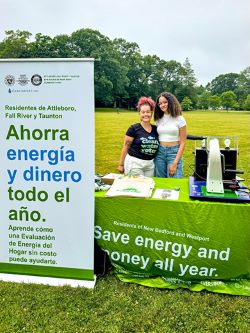
Clean Water’s
Massachusetts Energy
Efficiency Outreach
Specialist, Shay Brooks,
and Summer Intern,
Yobenny Tejeda Diaz,
signing up residents for
MassSave home energy
assessments at the
Attleboro Juneteenth
celebration.
PFAS Ban
We had a massive campaign victory at the end of the 2024 Legislative Session with the passage of a comprehensive ban on toxic PFAS in consumer products. The Consumer Product PFAS Ban Act of 2024 (S2152/H7356), which passed with unanimous support in both the House and Senate, will ban the sale of certain items containing PFAS like children’s products, carpets and rugs, cookware, cosmetics, fabric treatments, menstrual products, artificial turf, ski wax, and textiles. It also phases out the use of Class B firefighting foam containing PFAS, a major source of water contamination. PFAS are linked to numerous negative health impacts, including certain cancers, and Rhode Island continues to be a national leader in the fight against these toxic chemicals thanks to the letters, emails, and phone calls to legislators from our dedicated members.
Bottle Bill
And stay tuned this fall and winter for updates on our campaigns to fight plastic pollution! The Rhode Island study commission examining beverage bottle litter has been extended into 2025, and we will continue to fight for a Rhode Island bottle bill. Bottle bills are proven policy solutions that reduce litter and improve recycling rates. The expert testimony heard by the study commission so far all points in one direction — it’s time for a bottle bill in Rhode Island! Learn more and get involved at here.
Zero Waste & ReThink Disposable
Clean Water Action is leading a “Skip the Stuff” campaign to reduce unnecessary single use plastic utensils and condiments by restaurants only giving them to customers upon request. Restaurants save money, customers reduce clutter, and toxics are reduced from polluting our environment and health. Since March 2024, nine towns, including Hoboken and Jersey City, passed local ordinances (1 resolution) with several others close to joining this group. In the meantime, we are leading a statewide initiative to pass S3195.
Clean Water Action has been working with NJ emergency food providers to help eliminate single-use disposables. To date, we have saved these organizations over $200k, amounting to over 3 million single-use disposables and nearly 30,000 pounds of waste diverted.
Our most recent initiative, ReThink Disposable partners with ExplorUS, is designed to reduce single-use plastic waste at three National Parks: Jamaica Bay in NY, Mammoth Cave in KY, and Petrified Forest National Park in AZ. For information contact Marta Young at myoung@cleanwater.org.
Environmental Justice
Clean Water Action is dedicated to transforming the landscape of Environmental Justice by tackling this urgent issue head-on. To that end, we are addressing the critical need for clean, safe drinking water in New Jersey’s correctional facilities with the help of research partner Sydnie Bogan and the Women Who Never Give Up Foundation. Our campaign focuses on advocating for the installation of water systems that protect the health of incarcerated individuals and confront longstanding water quality issues. For more details on our work and to support our efforts, visit our campaign page.
Warehouse Campaign
With the recent introduction of Clean Water Action’s Warehouse & Pollution Act (S3546/A4670), sponsored by Senator Mckeon D-27 and Assemblywoman Katz, our Zero Emissions and Warehouse Organizer, Tolani Taylor is focused on curbing pollution at warehouses, ports and other truck attracting facilities in the Garden State. This is especially important for environmental justice and overburdened communities, which have the highest concentrations of warehouse facilities and freight truck traffic, air pollution, and related health impacts such as asthma and lung cancer. The bill would direct the NJ Department of Environmental Protection (DEP) to establish flexible compliance options to achieve specific air pollution reduction mandates, with higher thresholds for environmental justice communities. Want to help with this campaign? Contact Tolani at ttaylor@cleanwater.org.
2024 Elections
With Pennsylvania once again being the crucial tipping point battleground state, Clean Water Action is reaching out to thousands of voters across the state to ensure that PA’s 19 electoral votes go to elect Kamala Harris for President. Our right to breathe clean air and drink clean water is at stake! But don’t forget to vote the whole ballot this year — we have also endorsed Bob Casey for U.S. Senate, Malcolm Kenyatta for PA Auditor General, and Eugene DePasquale for PA Attorney General, all leaders with strong track records as environmental champions. And with control of our state legislature likely to be decided by only a seat or two, down ballot elections are more important than ever. See our full list of endorsements at: cleanwater.org/pa.
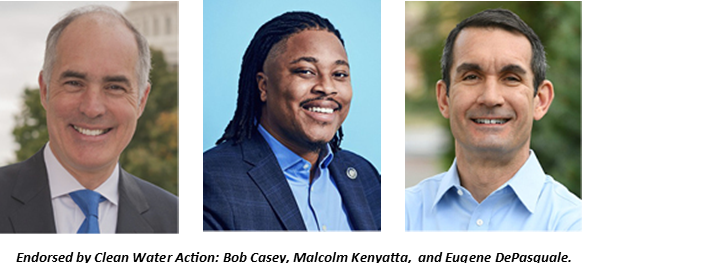
Push for PFAS Action Growing
With 69 co-sponsors in the State House, support for Rep. Scott’s bill to ban PFAS “forever chemicals” from consumer products is growing rapidly. Additional bills to protect firefighters from PFAS in gear and firefighting foam are also up for consideration this fall. Make sure your state legislators know that you want to see them support banning PFAS in our state before they ask us for their vote this November.
Groundwater Pollution
Summer in Texas brought the heat, fire and drought, and sometimes zombie wells and geysers spewing! What do abandoned and orphan oil and gas wells have to do with clean water, you ask? As waste water or “process water” from oil and gas drilling operations are often injected back into ground formations for disposal or to help build pressure to release harder-to-reach oil and gas product — “enhanced oil recovery or ERO — the water, chemical mix, and waste products find their way into existing fissures and breaks and makes its way to unexpected outlets, like this surprising 100-foot tall geyser eruption of oil-laced, salty water in West Texas on October 3rd. Not only is this NOT clean water, but these operations can also put groundwater supplies at risk for contamination beyond the point that humans would ever be able to recover the resource for use, not to mention wildlife and flora which rely on the resource for their habitats.
Clean Water Action in Texas continues to advocate for the strongest possible regulatory and permitting protections for groundwater, as well as compliance with existing laws, amidst ongoing and proposed injection and storage of these and other chemicals in underground structures. Please join us in calling for EPA to maintain control of permits for a new type of injection into underground structures which stand to put additional groundwater resources at risk across the state; sign our petition here.
This op-ed, co-signed by Clean Water Action’s Texas Director, Becky Smith was originally published in the Austin-American Statesman and was picked up on MSN: OPINION.
